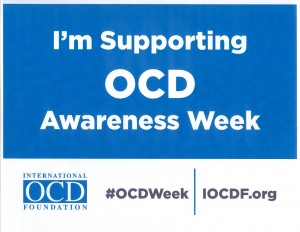 OCD Awareness Week is an international effort to raise awareness and understanding about obsessive compulsive disorder and related disorders.
OCD Awareness Week is an international effort to raise awareness and understanding about obsessive compulsive disorder and related disorders.
- Obsessive Compulsive Disorder (OCD) is a mental health disorder where the sufferer has repetitive and extreme obsessions and compulsions. Obsessions are unwanted intrusive distressing thoughts, images, or urges. Compulsions are behaviors the person does to get rid of the thoughts and distress. Symptoms take up at least one hour a day.
- The warning system in the brains of people suffering from OCD does not work correctly and tells them that they are in danger when they are not.
- About 1 percent of adults, children, and teens in the United States have OCD in a given year – that is over 3.3 million Americans.
- The mean age of diagnosis of OCD is 19, and 25% of cases start by the age of 14. Boys tend to develop symptoms earlier than girls.
- OCD is no laughing matter. On average, one in every four individuals with OCD will attempt suicide at some point in their lives.
- Scientific studies show that people with OCD have different brain patterns than people who do not have OCD.
- OCD tends to run in families. Abuse, trauma, and sometimes strep infections, also increase the risk of OCD in children and teens.
- Common obsessions in OCD include fears of: becoming contaminated or contaminating others, losing control, harming oneself or others, making mistakes, offending God, or doing something immoral.
- Common compulsions in OCD include washing and cleaning, mental and physical checking, repeating activities or movements, praying to prevent harm, confessing and seeking reassurance, and avoiding situations that might trigger obsessions.
- OCD is often accompanied by tic disorders, depression, eating disorders, substance abuse, attention deficit/hyperactivity disorder, and/or other anxiety disorders.
- Cognitive behavioral therapy, exposure and response prevention (ERP), acceptance and commitment therapy (ACT), and antidepressants are all effective treatments for OCD.
- Daniel Radcliffe, Cameron Diaz, Leonardo DiCaprio, Megan Fox, and Justin Timberlake are all celebrities who have lived with OCD.
Theresa Shank, Ph.D. is a leading expert on psychological treatment of OCD. She practices with CPE Clinic, LLC in Columbia, Annapolis, and Baltimore. She practices with CPE Clinic, LLC in Columbia, Annapolis, and Baltimore. Vivit https:iocdf.org/ or http://www.ocdmidatlantic.org/ to find more information and resources about OCD and to locate qualified treatment providers.
